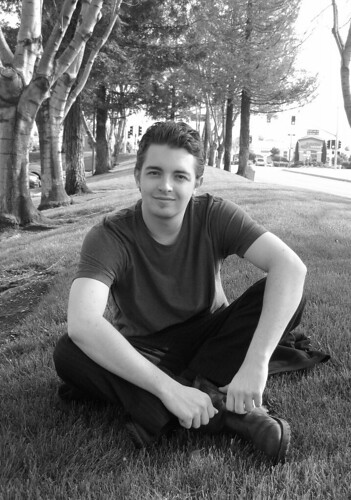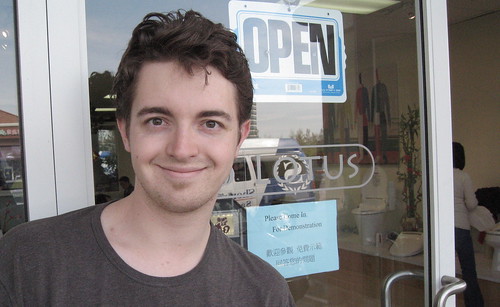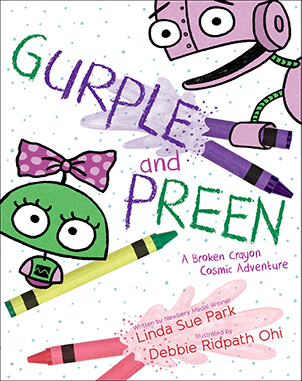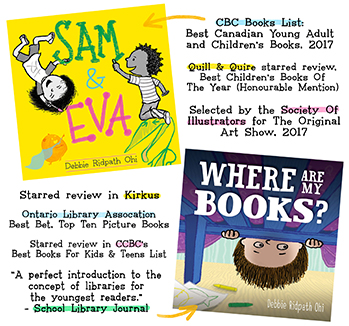Interview: Adam Selzer

(cross-posted from Inkygirl)
Adam Selzer is a 26-old writer whose first book for teens, How To Get Suspended And Influence People, was published by Random House earlier this year and has been favourably reviewed in Kirkus, Booklist and School Library Journal. HTGSAIP is packed with laugh-aloud moments, with fun characters and clever writing.
In addition to his writing career, Adam works as a guide for Weird Chicago Tours, a ghost tour company, and is also an accomplished songwriter and musician, with five CDs out. You can find out more about Adam's books and other projects at his site, AdamSelzer.com.

What's the first thing you ever wrote?
That would be "The P.U. Book" in 1987 - you can see it online. That was followed by a thing called The Great Monkey Hunt, about a couple of lions who hunt for pet monkeys. I have that around here someplace.
The first novel I wrote was when I was 15 - it was Dean Koontz-type book called Instant Karma. You can't see that one.
What was your first writing sale?
Well, outside of a couple of those "we'll print it if you buy a copy" poetry anthologies, I guess my first "sale" was a couple of short shorts to a sci fi fanzine when I was about 15. One was called "Time Isn't Real," which I don't remember much about, and another was called "PES," a sort of mock-Lovecraft piece about the Public Education System.
What are your writing habits?
Every day I get up fairly early and take my laptop to a coffee shop down the street. If I'm working on a new rough draft, I'll shoot for 1500 words per day. If I'm just editing stuff I've already written, I just work 'til I feel like I'm done for the day. Usually, I end up starting at 7 or 8 and working for about three hours. In the afternoon/evening, I usually hit another coffee shop, and if I feel like going beyond what I wrote that morning, I do. But I don't force myself past the 1500 word mark unless I'm on a deadline or something.
 |
Do you outline before you start writing? If so, how much?
Not when i first start out - I start out writing some very rough opening sketches. If I like where it's going, I'll spend a few days setting up a plot, then come up with a general outline for where things out to go. If I'm just doing a proposal, though, I'll do a more detailed synopsis much sooner. In a way, the entire rough draft is like one big outline. It gets all of the major pieces in place, then you go back and fix up the details, clean up the writing, and make sure it's funny enough.
Do you do any specific character outlines?
Almost never, really. For the most part, I'll write down a short paragraph or so, tops, on each character, and then fill it in as I go. I find that if I start out with two much information on the characters, you end up with this info dump of information that isn't really that important - no one really needs to know how tall Dustin Eddlebeck is, unless he's freakishly short or tall or something. I try to sort of let them build up organically, and keep my own outlines general enough that I can keep things sort of fluid in the long run.
It's a mistake a lot of people make, I think, trying to work too much information about a character or place into a book. "World building" is important, but those details should come out when they need to. There are piles and piles of information about the town where these books takes place that hasn't made it into the books yet, and I have a pretty good idea what'll happen to the characters a few years down the road, and what they were like years before. But it hasn't been necessary to work any of it in yet.
How did you get your agent?
I looked at writersmarket.com - or something like that, and found a few agencies that I thought would be a good fit. I'd been through the process before - I had another book a few years ago that another agent had tried to sell. But that agent didn't think "Suspended" would sell, so I started looking for someone else. I ended up sending queries to three places, and all of them asked to see a few chapters. I ended up getting to go with the one I liked best, which quite a novelty, since I'd previously been ready to sign with anyone who offered to represent me! I've been very happy with my agent - she's done a great job of keeping me working!
How much of you is in Leon (the main character of your book)?
I'm normally a lot more reserved than Leon, but I do tend to be a smart-ass. It's my job, after all. It says so on my business card.
I notice from your site that the sequel to HTGSAIP, Pirates of the Retail Wasteland, is coming out in early 2008. When you wrote HTGSAIP, did you know there was going to be a sequel?
I wasn't sure. There's actually a version of "Pirates" that was written a couple of years before "suspended" with different characters. It never went anywhere, but after Suspended was done, I realized that putting those characters into the basic plot of "Pirates" could be a lot of fun, especially for Brian the Pyro and Edie the Communist - I really liked writing those guys and wanted to use them more. Originally I was going to set Pirates well into the future - the characters in the original version were in college - but in the end it worked better to set it just a few months later. I would have been skipping over a lot!

How many times did you (or your agent) submit HTGSAIP before it was accepted?
HTGSAIP was sent to about 10 editors a once, but we got offers on the first submit. Having been through the process before without getting an offer, this made the world seem like a much friendlier place. When I got the call, I was on my way to work at an awful tourist-trap restaurant. After 11 years of work experience and a college degree, I was still only getting the same jobs - and about the same money - that I got when I was in eighth grade. I finally felt like I had a future outside of telling people that they couldn't get a baked potato instead of cole slaw. Obviously, I wasn't able to quit my day job at that point, but I could see a light at the end of the tunnel.
What did you do when you got the call? (e.g. Scream? Hug strangers? )
I sort of went numb for a second. Then I ran around on the pier (I was working at a restaurant at Navy Pier that summer). Then, ten minutes later, I had to try WAY harder than normal to pretend that I cared about the assistant manager's shouting match of the day. But I had a goofy grin on my face the whole time, I'm sure. I didn't have a chance to really get ecstatic til the bike ride home through the city. Think George Bailey at the end of "It's a Wonderful Life."
What projects are you working on now?
Lots of them!
We still have a few things to do on Pirates of the Retail Wasteland, and then I have a couple of satires of the spelling bee genre following that - I think the first one breaks the record for most Nixon jokes ever in a kids' book.
Beyond that, there's the aforementioned mystery series, a new middle grade project, a smart-alecky nonfiction book about US History, and possibly a graphic novel and a top-secret YA project. There's also talk of doing a Weird Chicago book to go along with the tours eventually. I THINK that's everything. Except for the live album, which is now being mixed for a late summer/early fall release. It'll compile together a lot of songs about characters and places that are also mentioned in the books.
This sounds amazing! Where can people buy your book-related CD, when it's available? Do you have any other CDs?
 |
It'll be on most of the usual CD selling sites, plus most of the digital ones, such as iTunes. It features one heck of a backing band and, including the free bonus EP, will have about 25 songs. It gives me a chance to do a better job with some of the older songs than I was capable of at the time - including my smash hit, "Pushing Cheerleaders Down the Stairs" (on which the graphic-novel-in-progress is loosely based). There aren't too many references to the songs in HTGSAIP (other than the town name), but a few more references ended up in Pirates - I liked one song character so much that I wrote her into the book!
I have a few other CDs - "Storm Shadow," "Suburban Post-Modernist," and "Clark Street Carols," that are all available on iTunes.
The "top-secret YA project" sounds intriguing. You sure you can't share any details?
The top secret one is in the earliest of stages, and, if it happens, it'll probably be under a pseudonym. It's always good to have spare proposals for a rainy day!
Could you tell me more about your graphic novel? It looks like graphic novels are becoming more and more popular with young people (and therefore with publishers). Are you doing the writing AND illustrating?
While I was cooking up new ideas earlier this year, I came up on the idea of expanding the song "Friday Avenue" into a book. Then I decided to combine it with "Pushing Cheerleaders Down the Stairs." After all, they both use the exact same D, F#7, G, D, chord pattern. After writing up a synopsis for Pushing Cheerleaders Down the Stairs, my agent suggested I try writing it as a graphic novel, which sounded like fun. I won't be doing the illustrating! There's a rather rough draft written up; I'll probably start revising it soon.
I think the biggest mistake a lot of people make is writing a lot of their own personal problems into a book. Writing about your problems can be very therapeutic, but it won't likely be all that marketable. I always try to bury anything autobiographical - it'll come out anyway, of course. I think it was Daniel Pinkwater who said there's never been a book that couldn't be subtitled "How To Be More Like Me." But write about your characters' problems, not your own. A lot of people get really upset when I say this - you always hear people say "write what you know." But there's a tendency to use that advice as an excuse not to be creative.
I'm curious about how a writer puts together a graphic novel. How detailed is the text? Do you describe each image, for example, and what text goes in what panel?
There's really no standard format - it's about like writing a screenplay, really. I might need to be more descriptive, frame by frame, than I have been so far, but so far I've just described the parts I think are really necessary to describe.
What's the main piece of advice you have for aspiring writers?
The most important thing is to write things you'd enjoy reading - one of the basic rules of writing a long project is that if it really starts to feel like work, not fun, then you're doing the wrong project. If it's not much fun (or satisfying, if it's one of those dark, depressing books) for you to write, it won't be much fun to read, either.
Also, stay away from people who think drugs will make you more creative. They won't. They might make you THINK you're being more creative, but you'll actually just end up broke. I get really sick of people who think getting wasted will make them better at writing - or anything else, for that matter.
Anything else you'd like to mention?
Don't forget to bug your local bookstore until they put HTGSAIP on the shelves! And don't forget to look for Pirates of the Retail Wasteland in February.
Since I have your attention, I'd also like to point people over to http://www.hullhouse.org - they do a lot of good work, and are worth checking into.
You can find out more information about Adam Selzer at his Web site, Adamselzer.com.

 adam selzer,
adam selzer,  interview in
interview in  Blog/news
Blog/news 





